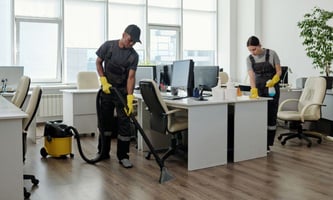In Melbourne, businesses understand the importance of a clean environment. Professional commercial...
Melbourne’s Best Practices for Effective Commercial Cleaning
When it comes to maintaining a clean and healthy environment in commercial spaces, Melbourne businesses must adopt effective cleaning practices. A clean workplace not only enhances the aesthetic appeal but also promotes employee productivity and well-being. Here are some best practices for effective commercial cleaning in Melbourne.
1. Develop a Cleaning Schedule
Creating a detailed cleaning schedule is essential. This schedule should outline daily, weekly, and monthly cleaning tasks. Daily tasks may include emptying trash bins, wiping down surfaces, and vacuuming high-traffic areas. Weekly tasks can involve deep cleaning carpets and sanitizing restrooms. Monthly tasks might include window cleaning and dusting hard-to-reach areas.
2. Use Quality Cleaning Products
Investing in high-quality cleaning products is crucial. Choose eco-friendly and non-toxic cleaners to ensure the safety of employees and clients. These products are effective in removing dirt and germs without harming the environment. Always follow the manufacturer's instructions for proper use.
3. Train Cleaning Staff
Proper training for cleaning staff is vital. Ensure that all employees understand the cleaning protocols and the correct use of equipment and products. Regular training sessions can help staff stay updated on the latest cleaning techniques and safety practices.
4. Focus on High-Touch Areas
High-touch areas require special attention. These include doorknobs, light switches, and shared equipment. Regularly disinfecting these surfaces can significantly reduce the spread of germs and viruses. Implement a routine that prioritizes these areas during each cleaning session.
5. Implement a Waste Management System
A well-organized waste management system is essential for effective cleaning. Provide clearly labeled bins for recycling, compost, and general waste. Regularly empty these bins to prevent overflow and maintain cleanliness.
6. Encourage Employee Participation
Encouraging employees to take part in maintaining cleanliness can be beneficial. Simple practices like keeping personal workspaces tidy and reporting spills can make a significant difference. Consider implementing a “clean desk policy” to promote a clutter-free environment.
7. Schedule Deep Cleaning
In addition to regular cleaning, schedule deep cleaning sessions. These should occur at least once a quarter. Deep cleaning involves thorough tasks such as carpet shampooing, upholstery cleaning, and air duct cleaning. This helps maintain a fresh and healthy environment.
8. Use Technology for Efficiency
Incorporating technology can enhance cleaning efficiency. Use cleaning management software to track tasks, schedules, and inventory. This can help streamline operations and ensure that nothing is overlooked.
9. Monitor and Evaluate Cleaning Practices
Regularly monitor and evaluate cleaning practices. Solicit feedback from employees about the cleanliness of the workplace. Use this information to make necessary adjustments to the cleaning schedule and practices.
10. Hire Professional Cleaning Services
For businesses that require extensive cleaning, hiring professional cleaning services can be a wise choice. These companies have the expertise and equipment to handle large spaces effectively. They can also provide specialized services such as carpet cleaning and window washing.
Conclusion
Implementing these best practices for effective commercial cleaning in Melbourne can lead to a healthier and more productive workplace. By developing a cleaning schedule, using quality products, training staff, and focusing on high-touch areas, businesses can maintain a clean environment. Encouraging employee participation and utilizing technology can further enhance cleaning efforts. Regular monitoring and professional services can ensure that cleaning standards are consistently met. Prioritizing cleanliness is not just about aesthetics; it’s about creating a safe and welcoming space for everyone.


